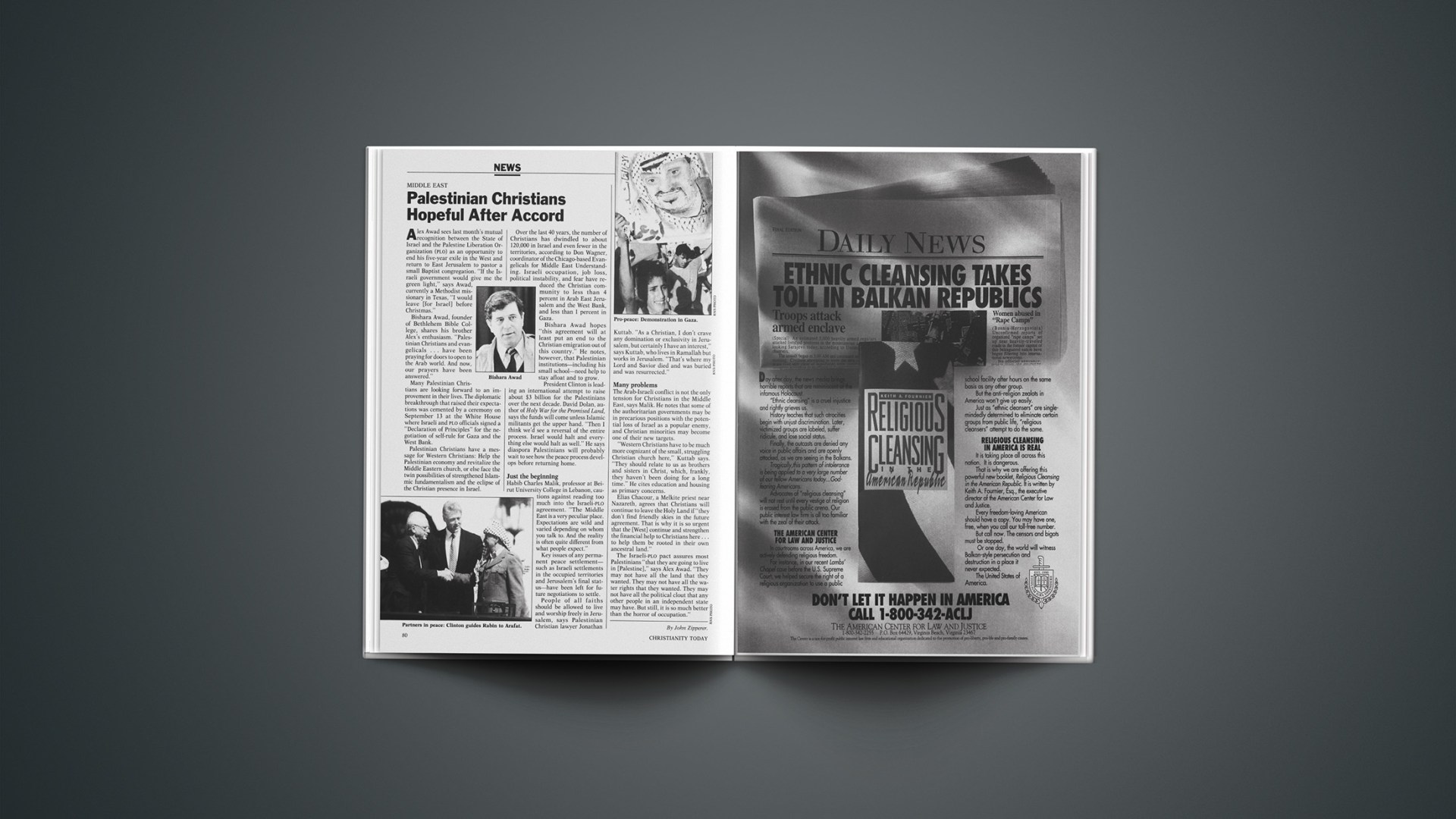Alex Awad sees last month’s mutual recognition between the State of Israel and the Palestine Liberation Organization (PLO) as an opportunity to end his five-year exile in the West and return to East Jerusalem to pastor a small Baptist congregation. “If the Israeli government would give me the green light,” says Awad, currently a Methodist missionary in Texas, “I would leave [for Israel] before Christmas.”
Bishara Awad, founder of Bethlehem Bible College, shares his brother Alex’s enthusiasm. “Palestinian Christians and evangelicals … have been praying for doors to open to the Arab world. And now, our prayers have been answered.”
Many Palestinian Christians are looking forward to an improvement in their lives. The diplomatic breakthrough that raised their expectations was cemented by a ceremony on September 13 at the White House where Israeli and PLO officials signed a “Declaration of Principles” for the negotiation of self-rule for Gaza and the West Bank.
Palestinian Christians have a message for Western Christians: Help the Palestinian economy and revitalize the Middle Eastern church, or else face the twin possibilities of strengthened Islammic fundamentalism and the eclipse of the Christian presence in Israel.
Over the last 40 years, the number of Christians has dwindled to about 120,000 in Israel and even fewer in the territories, according to Don Wagner, coordinator of the Chicago-based Evangelicals for Middle East Understanding. Israeli occupation, job loss, political instability, and fear have reduced the Christian community to less than 4 percent in Arab East Jerusalem and the West Bank, and less than 1 percent in Gaza.
Bishara Awad hopes “this agreement will at least put an end to the Christian emigration out of this country.” He notes, however, that Palestinian institutions—including his small school—need help to stay afloat and to grow.
President Clinton is leading an international attempt to raise about $3 billion for the Palestinians over the next decade. David Dolan, author of Holy War for the Promised Land, says the funds will come unless Islamic militants get the upper hand. “Then I think we’d see a reversal of the entire process. Israel would halt and everything else would halt as well.” He says diaspora Palestinians will probably wait to see how the peace process develops before returning home.
Just the beginning
Habib Charles Malik, professor at Beirut University College in Lebanon, cautions against reading too much into the Israeli-PLO agreement. “The Middle East is a very peculiar place. Expectations are wild and varied depending on whom you talk to. And the reality is often quite different from what people expect.”
Key issues of any permanent peace settlement—such as Israeli settlements in the occupied territories and Jerusalem’s final status—have been left for future negotiations to settle.
People of all faiths should be allowed to live and worship freely in Jerusalem, says Palestinian Christian lawyer Jonathan Kuttab. “As a Christian, I don’t crave any domination or exclusivity in Jerusalem, but certainly I have an interest,” says Kuttab, who lives in Ramallah but works in Jerusalem. “That’s where my Lord and Savior died and was buried and was resurrected.”
Many problems
The Arab-Israeli conflict is not the only tension for Christians in the Middle East, says Malik. He notes that some of the authoritarian governments may be in precarious positions with the potential loss of Israel as a popular enemy, and Christian minorities may become one of their new targets.
“Western Christians have to be much more cognizant of the small, struggling Christian church here,” Kuttab says. “They should relate to us as brothers and sisters in Christ, which, frankly, they haven’t been doing for a long time.” He cites education and housing as primary concerns.
Elias Chacour, a Melkite priest near Nazareth, agrees that Christians will continue to leave the Holy Land if “they don’t find friendly skies in the future agreement. That is why it is so urgent that the [West] continue and strengthen the financial help to Christians here … to help them be rooted in their own ancestral land.”
The Israeli-PLO pact assures most Palestinians “that they are going to live in [Palestine],” says Alex Awad. “They may not have all the land that they wanted. They may not have all the water rights that they wanted. They may not have all the political clout that any other people in an independent state may have. But still, it is so much better than the horror of occupation.”
By John Zipperer.










